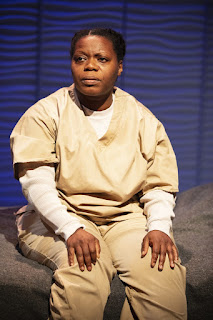Theater Review: Filmmaker Todd Solondz arrives off-Broadway
Emma and
Max
Written and directed by Todd Solondz
Starring Zonya Love, Ilana Becker, and Matt Servitto
The Flea Theater, Manhattan
October 12, 2018
I’m a big fan of the indie director Todd Solondz (b. 1959), whose 1990’s
films Happiness and Welcome to the Dollhouse viciously and
virtuosically eviscerate the suburban dream. I’ve been saddened that his
creative well may have run dry, with little work since 2000. Emma and Max, which just debuted off Broadway, is his first play, and perhaps is an
effort to reinvigorate his career writing for the stage. It’s certainly a good
start. It bears his distinctive style, with memorable visuals and some shock
plotting. But he has not yet learned quite how to pace a drama in the real time
of the theater, without the editing and jumps available in film.
One of the characteristics of the great 1990s Solondz films is the
juxtaposition of innocence and rhapsodic pictures of suburban bliss with the
utmost depravity (rape, pedophilia, decapitation). Solondz was the great
cautionary artist seeing the dry rot below the prosperity of that era and used
extreme metaphor to drive home the point. For example, a nice businessman takes
his young boy sex slave to McDonalds for a Big Mac and a toy. Then, we cringed
at this parody of normalcy. Alas, the recession made us all more cynical, so
perhaps Solondz has been awaiting a more prosperous era to make his comeback,
so he can once again burn down the building. This play does that, focusing on
immigration and income inequality. The most vivid character is Britney (an
excellent, put-upon Zonya Love), a black immigrant from Barbados, who works as
a maid and nanny for the insufferable rich couple Brooke and Jay. Brittany has
developed a great affection and bond with the couple’s spoiled kids Emma and
Max (who never appear onstage and play an éminence
grise role, driving much of the action). But then she gets fired, not so
much because of any malfeasance (although Britany concocts some theories to
justify the action) but just to provide a crisp new upgrade for the kids in the
form of a Swedish replacement.
Britney pathetically asks for why she is being
fired, and the couple is totally incapable of speaking to her as a human, resorting
to the sort of platitudes used in dysfunctional personnel actions in the business
world, e.g. providing treacly praise and business jargon while still firing you.
Much of the rest of the play then deals with the emotional and financial repercussions
of the firing on Britney, and on the couple’s endless superficial attempts to
deal with their liberal guilt.
The play is admirable focused, but a little short
on ideas or complexity. The couple is presented largely as laughable wealthy
liberal stereotypes, and unfortunately gain none of our sympathy as the child-molester
did in Happiness. I was surprised
that Solondz did not flesh these characters out more, as that was one of the
great strengths of the films. The most striking aspects of the play were not
the dialogue, but the visuals. The set was a fascinating half hexagon, with rooms
constantly emerging from the three back walls. Poor Britany did all of the
scene changes herself, laboriously pulling beds and chairs in and out, all with
an obviously aching back. This was a great visual metaphor for how we do not
really see the working class people who work for us and make our high-flying
decision making possible by keeping the infrastructure intact. Swimming pools,
cabanas, and offices appeared magically with the use of simple but brilliant video, lighting and set effects, all put in place by Britany.
There was a good cumulative build up of plot tension, and I really
wondered how the play would end. Unfortunately, I was dissatisfied with the
expected Solondz “shock” ending, which I will not reveal. In Solondz’ films we directly
see carnage and violence and have to reconcile that with the placid, familiar
characters. Here, we hear about the tragic denouement
retrospectively in a prison interview, much as a dowdy 18th century
author would do. This made the play end with a whimper, not a bang, and left me
dissatisfied. The ending is not really a shock (if you know Solondz), but
somehow seemed disconnected and removed from the prior drama, rather than as an
emotional cap to it. Too bad, since Solondz can still make us cringe at the
self-serving yuppie banter of the couple vs. the grounded misery of Britany,
and in general with his keen microscope on our cultural failings. So this was
not a completely successful play. But it was great to see this talented writer/director
back in action, and I think with a little more practice he can give us some
compelling plays.



Comments
Post a Comment